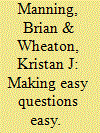| Srl | Item |
| 1 |
ID:
140498


|
|
|
|
|
| Summary/Abstract |
Very often intelligence history concentrates on the knowledge produced by a country's intelligence service and its impact on national decision-making, or – in the case of intelligence failures – the lack thereof. Using a previously unexplored document from the archives of the French Foreign Ministry, this research note proposes another contribution of intelligence history to diplomatic history: By analysing national intelligence requirements – the ‘top secret diaries’ of governments – intelligence history can provide a window into the minds of decision-makers. The 1948 French plan de renseignement illustrates this case. Written shortly after the Cold War started in earnest in 1947, the plan de renseignement shows a French government deeply worried about the danger of global conflict and of internal upheaval in its empire, but also a government not fully committed to the western cause and particularly sceptical about American intentions. French foreign policy was at a crossroads in 1947/48 and, quite sensibly, French policy-makers wanted to know exactly what lay on all the possible roads ahead. While these findings do not contradict existing scholarship, they may help to encourage a re-weighing of existing arguments.
|
|
|
|
|
|
|
|
|
|
|
|
|
|
|
|
| 2 |
ID:
122919


|
|
|
|
|
| Publication |
2013.
|
| Summary/Abstract |
Intelligence analysts spend a good deal of time discussing accuracy in forecasting and they should. Saying accurate things about the future is arguably much more valuable to decisionmakers than saying accurate things about the present or past. Doing so is also inherently more difficult.
Even when trying to say accurate things about the future, though, some questions are easier for analysts to answer than others. Why? What are the essential elements of a question that make it obviously more or less difficult to answer? How can these criteria be generalized across all questions?
Intelligence professionals are not the only ones to recognize the inherent difficulties in different kinds of questions. Michael V. Hayden, the former Director of both the Central Intelligence Agency (CIA) and the National Security Agency (NSA), delights in telling this story:
Some months ago, I met with a small group of investment bankers and one of them asked me, "On a scale of 1 to 10, how good is our intelligence today?" I said the first thing to understand is that anything above 7 isn't on our scale. If we're at 8, 9, or 10, we're not in the realm of intelligence-no one is asking us the questions that can yield such confidence. We only get the hard sliders on the corner of the plate. 1
|
|
|
|
|
|
|
|
|
|
|
|
|
|
|
|